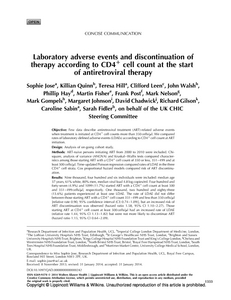Jose, S;
Quinn, K;
Hill, T;
Leen, C;
Walsh, J;
Hay, P;
Fisher, M;
Post, F;
Nelson, M;
Gompels, M;
et al.
Jose, S; Quinn, K; Hill, T; Leen, C; Walsh, J; Hay, P; Fisher, M; Post, F; Nelson, M; Gompels, M; Johnson, M; Chadwick, D; Gilson, R; Sabin, C; Fidler, S; UK CHIC Steering Committee
(2014)
Laboratory adverse events and discontinuation of therapy according to CD4 R cell count at the start of antiretroviral therapy.
AIDS, 28 (9).
1333 - 1339.
ISSN 0269-9370
https://doi.org/10.1097/QAD.0000000000000242
SGUL Authors: Hay, Phillip Edward
![[img]](https://openaccess.sgul.ac.uk/107162/1.hassmallThumbnailVersion/Laboratory_adverse_events_and_discontinuation_of.11.pdf)  Preview |
|
["document_typename_application/pdf; charset=binary" not defined]
Published Version
Available under License St George's repository terms & conditions.
Download (335kB)
| Preview
|
Abstract
Objective: Few data describe antiretroviral treatment (ART)-related adverse events when treatment is initiated at CD4+ cell counts more than 350 cells/μl. We compared rates of laboratory-defined adverse events (LDAEs) according to CD4+ cell count at ART initiation.
Design: Analysis of on-going cohort study.
Methods: ART-naive persons initiating ART from 2000 to 2010 were included. Chi-square, analysis of variance (ANOVA) and Kruskal–Wallis tests compared characteristics among those starting ART with a CD4+ cell count of 350 or less, 351–499 and at least 500 cells/μl. Time-updated Poisson regression compared rates of LDAE in the three CD4+ cell strata. Cox proportional hazard models compared risk of ART discontinuation.
Results: Nine thousand, four hundred and six individuals were included: median age 37 years, 61% white, 80% men, median viral load 4.8 log copies/ml. Four hundred and forty-seven (4.9%) and 1099 (11.7%) started ART with a CD4+ cell count at least 500 and 351–499 cells/μl, respectively. One thousand, two hundred and eighty-three (13.6%) patients experienced at least one LDAE. The rate of LDAE did not differ between those starting ART with a CD4+ cell count 351–499 and less than 350 cells/μl [relative rate 0.90, 95% confidence interval (CI) 0.74–1.09)], but an increased risk of ART discontinuation was observed (hazard ratio 1.58, 95% CI 1.10–2.27). Those starting ART at CD4+ cell count at least 500 cells/μl had an increased rate of LDAE (relative rate 1.44, 95% CI 1.13–1.82) but were not more likely to discontinue ART (hazard ratio 1.15, 95% CI 0.64–2.09).
Conclusion: This study demonstrates the need to consider ART-related toxicities when initiating therapy at CD4+ cell counts at least 500 cells/μl. Whilst evidence from randomized controlled trials is awaited, the timing of ART initiation in terms of benefits and risks of ART remains an important question.
| Item Type: |
Article
|
| Additional Information: |
© 2014 Wolters Kluwer Health | Lippincott Williams & Wilkins
This is an open access article distributed under the Creative Commons Attribution License, which permits unrestricted use, distribution, and reproduction in any medium, provided the original work is properly cited. http://creativecommons.org/licenses/by-nc-nd/3.0. |
| Keywords: |
Science & Technology, Life Sciences & Biomedicine, Immunology, Infectious Diseases, Virology, IMMUNOLOGY, INFECTIOUS DISEASES, VIROLOGY, biological markers, CD4(+) lymphocyte count, drug toxicity, HAART, HIV, HIV-INFECTION, COHORT, UK, Virology, 06 Biological Sciences, 11 Medical And Health Sciences, 17 Psychology And Cognitive Sciences |
| SGUL Research Institute / Research Centre: |
Academic Structure > Infection and Immunity Research Institute (INII) |
| Journal or Publication Title: |
AIDS |
| ISSN: |
0269-9370 |
| Related URLs: |
|
| Web of Science ID: |
WOS:000335972500011 |
| Dates: |
| Date |
Event |
| 2014-06-01 |
Published |
|
| URI: |
https://openaccess.sgul.ac.uk/id/eprint/107162 |
| Publisher's version: |
https://doi.org/10.1097/QAD.0000000000000242 |
Statistics
Item downloaded times since 15 Sep 2014.
Actions (login required)
 |
Edit Item |


